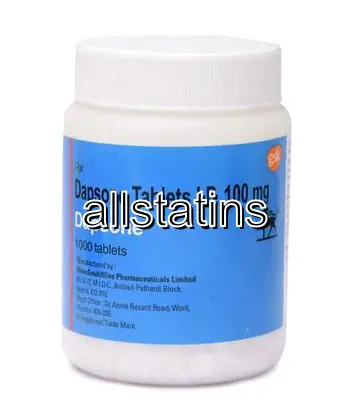Buy Dapsone (Diaminodiphenyl Sulfone) Online in the USA at All Statins
| Package | Dosage | Price | Price per Dose | |
|---|---|---|---|---|
| Dosage: 100mg | ||||
| 1000 pill | 100mg | $114.82 | $0.11 | |

Dapsone Description
Introduction to Dapsone
Dapsone is a medication that has been widely used for its antibacterial and anti-inflammatory properties. Originally developed to treat leprosy, it has found applications in managing a variety of other medical conditions. Its effectiveness in combating certain bacteria and its role in controlling inflammatory responses make it a valuable drug in modern medicine.
Medical Uses of Dapsone
Dapsone is primarily prescribed for treating leprosy, especially in cases of multibacillary leprosy. It is often used as part of combination therapy to effectively eradicate the bacteria. Additionally, this medication is employed in treating dermatitis herpetiformis, a skin condition associated with gluten sensitivity. Some patients use it to manage infections like Pneumocystis jirovecii pneumonia, particularly in immunocompromised individuals, often alongside other drugs. Its anti-inflammatory properties also make it useful in treating certain blistering skin disorders and other dermatological conditions where inflammation plays a key role.
How Dapsone Works
Dapsone works by inhibiting the synthesis of folic acid within bacteria. This action hampers bacterial growth and replication, effectively controlling infections. In inflammatory skin conditions, Dapsone’s ability to modulate immune responses helps reduce lesions and symptoms. Its mode of action makes it a versatile drug, although it requires careful monitoring due to potential side effects associated with its use.
Dosage and Administration
The dosage of Dapsone depends on the condition being treated, the patient's age, weight, and response to therapy. It is usually administered orally in tablet form. Patients are advised to follow their healthcare provider’s instructions strictly and to adhere to prescribed dosages. Regular monitoring through blood tests might be necessary to track liver function, blood cell counts, and overall health, especially during long-term therapy.
Potential Side Effects
Although Dapsone is effective, it can cause side effects in some individuals. Common adverse effects include nausea, headache, and rash. More serious risks involve hemolytic anemia, especially in patients with glucose-6-phosphate dehydrogenase (G6PD) deficiency, which can lead to significant red blood cell destruction. Other potential issues include methemoglobinemia, which reduces oxygen delivery in blood, and hepatitis. Due to these risks, careful medical supervision and regular blood tests are essential during treatment.
Precautions and Interactions
Before starting Dapsone, it is important to inform your healthcare provider about any existing health conditions, especially blood disorders, liver disease, or G6PD deficiency. It is also crucial to discuss all medications you are taking, as Dapsone can interact with other drugs such as rifampicin, certain antibiotics, and medications that affect blood counts. Patients should avoid alcohol and notify their doctor immediately if they experience any unusual symptoms or allergic reactions.
Conclusion
Dapsone remains a vital medication in the treatment of various infectious and inflammatory conditions. Its effectiveness depends on proper dosage and close monitoring to prevent adverse effects. As with any medication, it should be used under medical supervision to ensure safety and optimal therapeutic outcomes. Patients must adhere to the prescribed regimen and report any side effects to their healthcare provider promptly.